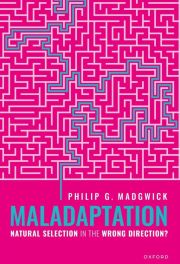Maladaptation: Natural Selection in the Wrong Direction?

P G Madgwick
Oxford University Press, £30
After mastering pronunciation of the title, the next challenge is to address its meaning, to which the first 25 pages are largely devoted. But despite the stated ambition to appeal to ‘any inquisitive reader with a general interest in science and the natural world,’ the dense discussion often fails to achieve that. Even so, this thorough and erudite disquisition does have its merits, principally in proposing a novel approach to evolutionary biology that explores the apparent enigma of the persistence of harmful traits (e.g. inherited diseases) in a process underwritten by ‘the survival of the fittest.’
Prominent throughout are references to the argument advanced by the 19th century theologian William Paley, whose analogy of the random discovery of a watch on a heath, unlike the surrounding stones, implied the necessity of a designer (i.e. God), a claim which was accepted as valid by the younger Darwin. But the evidence he advanced in his Origin of Species convinced him, and virtually all subsequent biologists, that natural selection obviated Paley’s claim.
The author’s central thesis is that such a categorical dismissal of Paley’s reasoning is flawed, a defence of which occupies much of the book and documents evidence and counter-evidence from a galaxy of prominent philosophers and scientists, such as Hume, Haldane, Gould, Maynard Smith, Popper et al and twenty algebraical formulae. However, this is not a simplistic debate involving believers and non believers, but a rigorously non-partisan enquiry.
Prof Ben Mepham FRSB
Reviewed by Professor Ben Mepham FRSB, honorary Professor in Bioethics at Nottingham University, founder and executive director of the Food Ethics Council, and a member of the Government’s Biotechnology Commission


